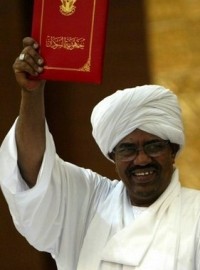President Bashir ratifies Sudan’s elections law
July 14, 2008 (KHARTOUM) — Sudanese President Omer Hassan al-Bashir today evening signed election law, passed by the National Assembly on 7 July 2008, a crucial move towards the holding of general elections next year.
 The ratification ceremony was held at Khartoum’s Friendship Hall and was attended by the First Vice President Salva Kiir Mayadrit, Vice President Ali Osman Taha, government officials and the diplomatic corp.
The ratification ceremony was held at Khartoum’s Friendship Hall and was attended by the First Vice President Salva Kiir Mayadrit, Vice President Ali Osman Taha, government officials and the diplomatic corp.
Speakers were unanimous about the importance of the electoral law for the next phase of democratization and political transition in the country
The gathering was first addressed by the representative of the Committee for Unification of National Ranks, al-Najib Adam Kamar Eddin who hailed the ratification saying Sudan enters a new phase where the elections will involve all political forces to form the political reality and also guarantee opportunities for peaceful transfer of power.
He further said the ratification of the law provides an opportunity to find a solution for Darfur crisis calling all the rebel movements to engage in talks for peace and settlement
The secretary-general of the Union of Sudanese Women, Mrs. Raja Hassan Khalifa, described the Elections Act as a key law regulating political life in Sudan towards democratic development. She further said that the signing of the law may be a response to the conspiracies of the arbitrator Prosecutor of the ICC.
Speaking during the occasion, the representative of the Council of States, Sheikh Abu Ali Majdhub Abu Ali, hailed the ratification of the new election law and condemned the International Criminal Court’s accusations of war crimes leveled against Sudanese top officials.
During the ceremony, a band then played a popular song entitled “Ana Sudani” (I am Sudanese) and Al-Bashir, Kiir and Taha stood up as dozens of guests and officials left their seats and joined in a moderate dance. The president waved his cane in time with the music as attendees walked up to greet him.
The elections law lays the basis to run the first fair elections in the country since the Islamist coup d’Etat of 1989 by adopting a mixed electoral system. 60 per cent of the 450 MPs will be chosen through the majority elect in their geographical constituencies. It also guarantees 25% of the parliamentary seats to women who will be elected through the proportional representation with other 15% of the MPs.
The new law organizes the holding of general elections in the country at three levels, including presidential election and elections for the federal parliament and regional legislative chambers, while voters in southern Sudan have also to elect the president of the government there.
The bill sets 4 percent minimum vote needed for any party to enter parliament through the proportional representation and requires for candidates at presidential elections to get at least 200 endorsements from 18 of Sudan’s 25 states.
(ST)

Mr Famous Big_Logic_Boy
President Bashir ratifies Sudan’s elections law
No time beshir just fire which means hell is the only way for you,go aways every one hates you even your own wife hates you because your evil spirit is so stupid.
AramanaCaani junuba
President Bashir ratifies Sudan’s elections law
Were it not for the ICC indictment,this ratification would have taken months perhaps years to be done,NCP dubious games to frustrate the situation.But who will attempt to vote for an internationally recognized criminal to the presidency again? unless we are unpatriotic enough to our country and out of our normal senses to elect any one,(2009 election) from NIF/NCP,CRIMINAL ORGANIZATION!
Even Taha may not be a good option to anyone.
Baggaran
President Bashir ratifies Sudan’s elections law
General Genocide should hold the elections soon.
If not then a military coup will soon replace the failed leader of a failed state.
Hassan Turabi, one of Sudan’s leading opposition figures, predicted that the country’s ruling elite would voice strong public support for the president, but would eventually splinter.
“This will create a lot of trouble inside the inner circle,” Turabi said. “In Sudan, leaders are supposed to rule through awe and terror and intimidation. This is destroying that image. Now people see him as vulnerable.”